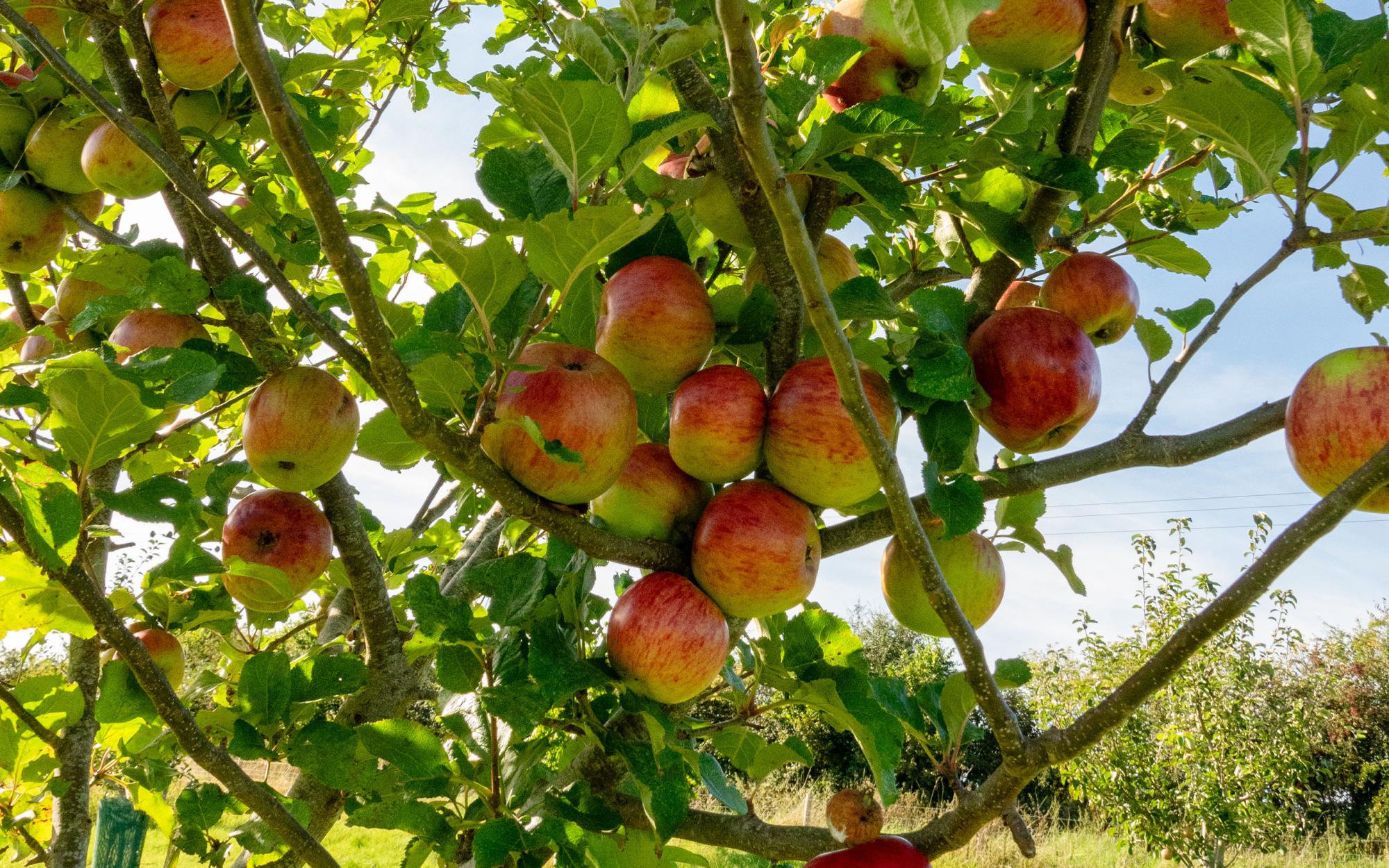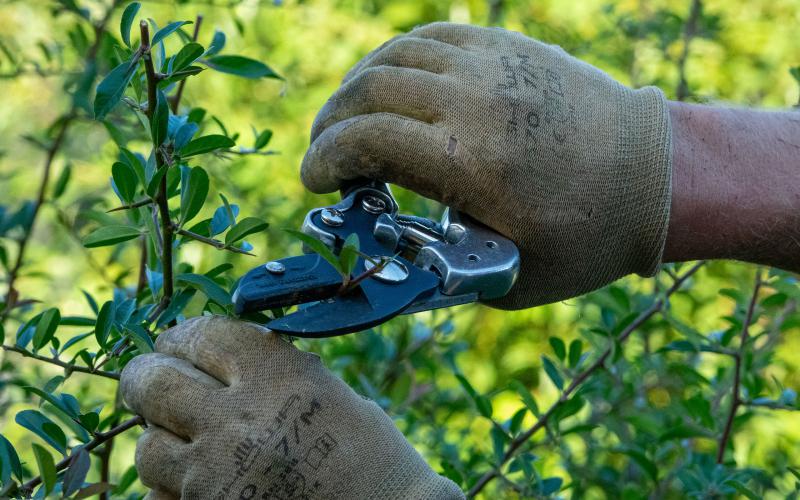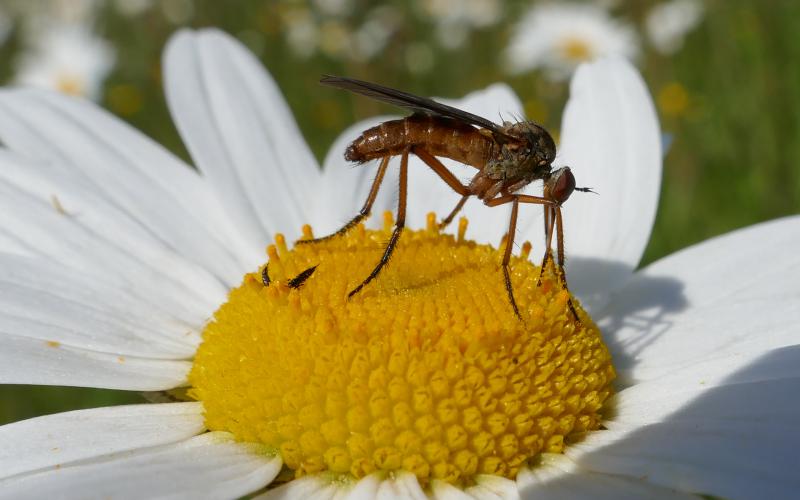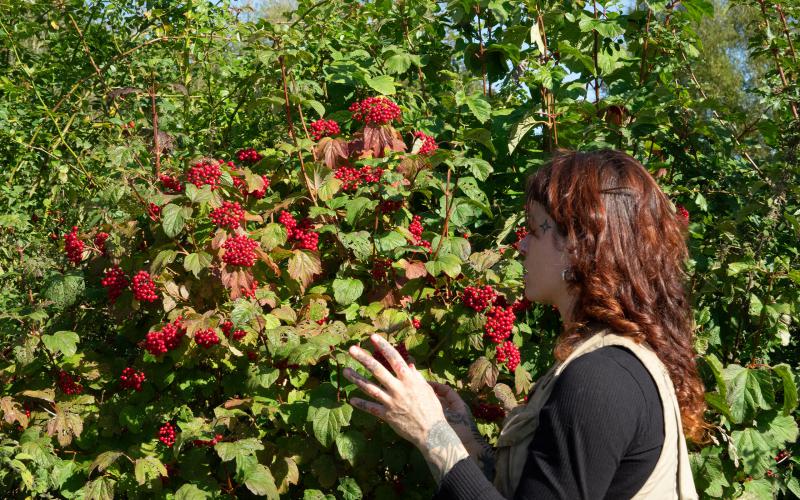Field Notes: 9th - 16th September 2024
Sep 16, 2024

Field Record: What’s been happening on the 107 acres of Honeydale Farm?
If you’ve been for a walk around the farm recently, you may have noticed that our heritage orchard is looking very bountiful. The trees are laden with damsons, pears, and an incredible 150 different apple varieties, some now ready for harvesting. If you’ve stopped by the Cafe, you may have spotted a big bowl of apples on the counter - please help yourself! It’s a perfect way to sample the different varieties. See if you can notice the subtle differences in appearance and flavour. Of course apples count as one of your five a day too! As the old saying goes: “An apple a day keeps the doctor away”!
Did you know, an easy way to check if an apple is ripe is the ‘twist test’. Lay your hand flat and gently cup the apple in your hand, tilting or twisting it horizontally. If it comes off easily, it’s ready to pick. If you need to pull or yank it off, it needs a little more time on the tree.
As well as orchard duties, we've been tackling some of the usual farm tasks—pruning the bushes around the buildings and rotating our sheep across the farm as part of our ‘mob grazing’ system.
Don't forget to mark your calendars for our upcoming Apple Day celebration! Get your tickets here.

Pruning duties!
Events Recap: What’s on at FarmED?
Lunchtime Talk - Bug Life at FarmED

One of the fabulous insects on our farm!
Last Wednesday, our resident entomologist, Alex (who doubles up as our Public Engagement Coordinator) led a Lunchtime Talk on the fascinating world of insects. He shared his discoveries from around the farm, including moths, bees, butterflies and more. He highlighted the crucial roles that these tiny creatures play in our ecosystem, from pollination to pest control.
One of the key points Alex focused on was the relationship between landscape diversity and insect populations. By creating a varied and vibrant landscape, we encourage a wider range of insects to thrive, which in turn supports the overall health of the farm. He explained how this biodiversity positively impacts everything from soil fertility to crop production.
Alex also urged us to pay attention to the insect life around our own homes and gardens. Ground beetles and dung beetles, in particular, are excellent indicators of soil health!
Foraging Farm Walk

Foraging in the sunshine!
What a beautiful way to start the week! On Monday morning, Justine Gens, expert forager and trained herbalist, led a group of fledging foragers around the farm. She began the walk by explaining how a plant’s medicinal and nutritional properties shift with each season. In spring, the shoots and leaves hold the most nutrients; in summer, it’s the flowers; in autumn, the berries; and in winter, the roots, as the nutrients return to the soil. Amazingly, plants naturally adapt to what our bodies need in each season. In autumn, vitamin-rich berries help us to fight off colds and flus, while carb-heavy roots provide the energy we need to stay warm in the winter.
As the morning sun shone down on the farm, we then set off to forage. We found hawthorn berries, elderberries, sloes and rosehips, as well as wild chicory, yarrow, broadleaf plantain, stickyweed and silverweed. Justine talked us through the medicinal properties of each plant, explaining how to harvest them properly and sharing some simple recipes. It was a reminder of how so much natural wisdom has been lost in the age of modern medicine, and just how connected we really are to the seasons.
One of the most fascinating things we learned was that stickyweed, that clingy plant we all used to stick to each other's backs, is actually the cousin of the coffee plant. By harvesting the seeds, roasting them for no more than five minutes, and grinding them into a powder, you can brew a cup of coffee straight from the fields!
Justine hosts seasonal foraging walks here on the farm throughout the year. Keep an eye on our "What’s On" guide for more!
Garden Treasures: What’s been happening down in the kitchen garden?

Spot these beautiful zillias in the FarmED Cafe!
Things in the garden are beginning to slow down after last week’s chilly spell. While we managed to avoid the season’s first frost, the weather felt truly autumnal and had us all reaching for our jumpers. Earlier in the week, we spent time clearing out the celery beds and re-sowing them with winter brassicas to prepare for the colder weather. We also mulched and weeded the asparagus beds, making sure they’ll be in good shape for next season.
We had a special visitor on Thursday: Bruce, one of our beloved growers from last year and a part of the Kitchen Garden family. It was wonderful to have him back on the farm, even if just for the day. Bruce has been busy completing his masters degree in Aberdeen and is now starting his PhD focused on forestry in Nepal. Despite the time away, it felt like he’d never left as we all worked together to weed the beetroot plants.
We dug up potatoes in the showery afternoon sunshine and on Friday, we had a big harvest for our weekly shares. This week’s boxes consisted of salad leaves, Swiss chard, cucumbers, tomatoes, aubergines, french beans, and a whole lot of basil. It’s officially the last basil of the season, so now is the perfect time to make some pesto (if you haven’t already!) to store away for the winter months.
While some crops are now starting to dwindle, others are just coming into their own, like our lovely carrots. Although small, they’re full of flavour and smell divine. Our chilli’s are still going strong, too, and we held our annual chilli taste test in the week. After plenty of watery eyes and a whole lot of laughter, we can confirm they pack a serious punch! One of the FarmED kitchen team, Ben, got a shock when he took a big bite of one, thinking it was a pepper...
The shift in seasons is definitely upon us, but there’s still plenty of life left in the garden, and we’re savouring every moment of it.
Recent news items




